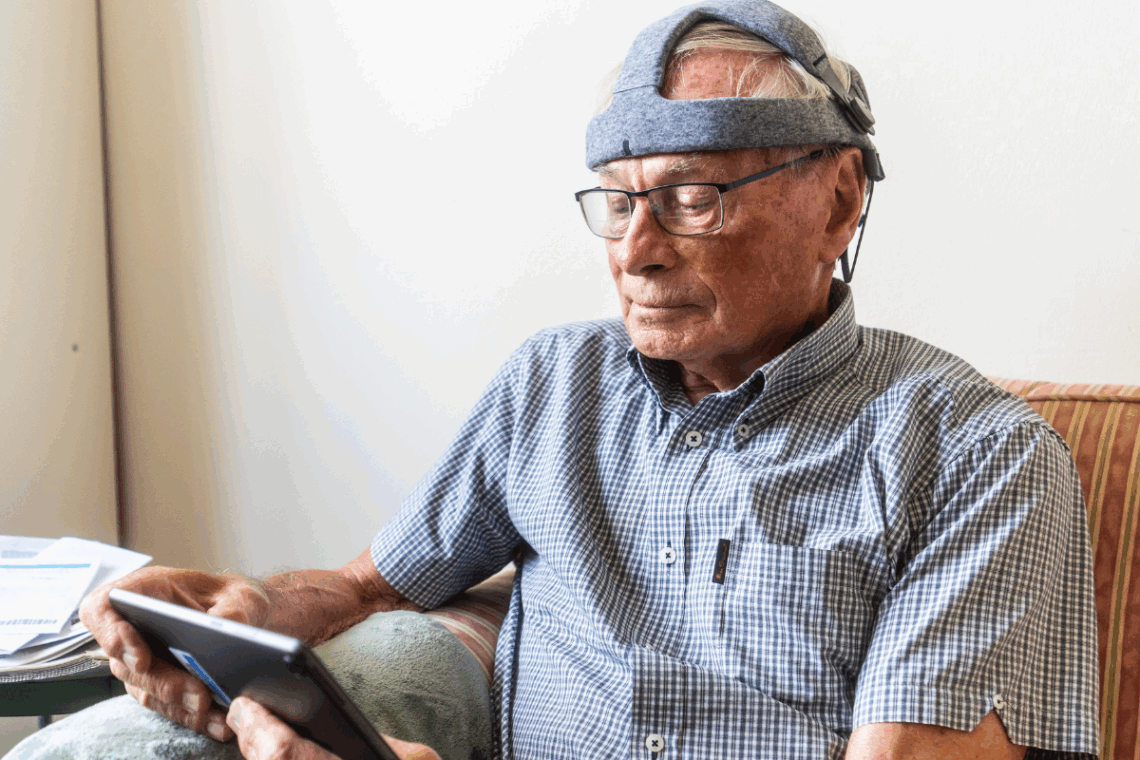A simple at-home brainwave test can detect signs of memory impairment linked to Alzheimer’s disease years before clinical diagnosis is typically possible.
This feat has been demonstrated by researchers from the universities of Bath and Bristol, in the U.K., who trialed the ‘Fastball EEG’ technology in patients’ homes for the first time.
The three-minute “passive test”—which records electrical activity in the brain while participants view a stream of images—can reliably identify memory problems in people with Mild Cognitive Impairment (MCI)—a condition that can lead to Alzheimer’s.
“We’re missing the first 10 to 20 years of Alzheimer’s with current diagnostic tools. Fastball offers a way to change that—detecting memory decline far earlier and more objectively, using a quick and passive test,” said study author George Stothart, a cognitive neuroscientist at Bath, in a statement.
The work follows the team’s previous study in 2021 that demonstrated Fastball was sensitive to memory impairment in Alzheimer’s disease.
The researchers have now shown the test can be administered in people’s homes outside of a clinical environment—although, of course, it can also be used in doctor’s offices and memory clinics. This opens the door to wider screening and monitoring using accessible, low-cost technology, the teamsaid.
While people can do the test independently, it is not designed for immediate feedback to the patient and results are sent back to the doctor, Stothart told Newsweek.
He said the long-term goal of the test would be to use it as a screening tool for over 55s, with more research needed to establish the most effective stage at which to take it. Candidates may be identified in primary care when they self-refer to their doctor about memory symptoms or in secondary care when they’ve been identified by their doctor and referred to a neurologist.
More than seven million Americans are living with Alzheimer’s, a number projected to rise to nearly 13 million by 2050.
The research team explained that with the development of breakthrough Alzheimer’s drugs donanemab and lecanemab, an early diagnosis is more important than ever before. These drugs are clinically proven to be the most effective in the early stages of the disease.
“There are finally therapeutic interventions, drugs and lifestyle interventions that we have at our disposal that can slow Alzheimer’s. This allows people to plan and alleviates worry if they are fine. It gives people certainty,” Stothart explained.
Nearly 4 in 5 Americans would want to know if they had Alzheimer’s disease before having symptoms, or before those symptoms interfered with their activities, according to the Alzheimer’s Association. Furthermore, some 92 percent of Americans would want to take a medication that could slow the progression of Alzheimer’s.
“MCI presents around five years before Alzheimer’s, so detection five years earlier means patients can get on the drugs earlier and the lifestyle interventions earlier,” Stothart added.
Fastball monitors the brain’s automatic responses to images without requiring participants to follow instructions or recall information. This makes it more objective and accessible than traditional memory tests, according to the team.
Fastball was found to detect early memory issues in people with MCI likely to develop Alzheimer’s, delivered reliable results in real-world home settings and showed reduced memory responses even in patients who later progressed to dementia.
“Identifying individuals early for cognitive decline is going to be of increasing importance as therapies for Alzheimer’s and other dementias are developed and this protocol ‘Fastball’ seems as if it may be helpful in this regard,” Sir John Hardy, professor of neuroscience and group leader at the UK Dementia Research Institute, not involved in the research, said in a statement.
“What it does not do (and does not claim to do) is distinguish early Alzheimer’s from other causes of decline and this latter is also important. Because of this, it is likely that additional tests, biomarker or imaging, would also be needed for this second important aim.”
Indeed, Stothart told Newsweek that the scan can present more of a “red flag.” He explained: “Very unlikely any single test would say ‘you have Alzheimer’s’—it would be Fastball, combined with blood test, combined with your case report.
“It’s a tool in the toolbox with clinicians and right now the clinicians toolbox is empty so it help them make the decision in a more sensitive, earlier, accurate way.”
“This study was robustly conducted but the number of participants was relatively small (33 people with memory deficits, 20 people with deficits in other cognitive domains and 54 people without cognitive deficits),” commented Tara Spires-Jones— a professor of neurodegeneration at UK Dementia Research Institute and the University of Edinburgh who was also not involved in the study—in a statement.
She added: “The follow-up time was also only one year and there were no tests of blood, cerebrospinal fluid or brain scans to confirm whether people had early Alzheimer’s disease,”
“While this is a strong study, more work is needed before this test might be added to routine testing for early stages of diseases that cause dementia.”
Stothart explained they are in the middle of two 1,000 patient studies, one in the U.K. and one in the U.S., that will tell them how accurate the test is in a large data set. These conclude in 2027 and will help them to decide where to try and incorporate the healthcare test, for example in primary or secondary settings.
He hopes patients might benefit from this in around five years time. He also said the technology can be used internationally and Fastball is already being used in 30 sites in the U.S., mostly in Florida.
Do you have a tip on a health story that Newsweek should be covering? Do you have a question about Alzheimer’s? Let us know via [email protected].
Reference
Stothart, G., Alderman, S., Hermann, O., Creavin, S., & Coulthard, E. (2025). A passive and objective measure of recognition memory in mild cognitive impairment using Fastball memory assessment. Brain Communications. https://doi.org/10.1093/braincomms/fcaf279
Stothart, G., Smith, L. J., Milton, A., & Coulthard, E. (2021). A passive and objective measure of recognition memory in Alzheimer’s disease using Fastball memory assessment. Brain, 144(9), 2812–2825. https://doi.org/10.1093/brain/awab154
The post Alzheimer’s: At-Home Brainwave Test Offers Early Warning appeared first on Newsweek.




